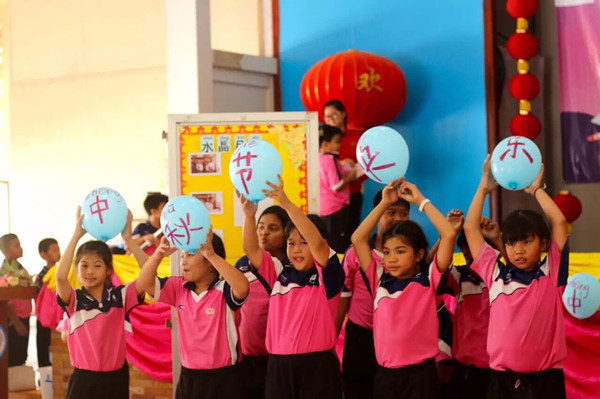Chinese learning craze hits Thailand under Belt and Road Initiative
- By Niu Jingjing
 0 Comment(s)
0 Comment(s) Print
Print E-mail China.org.cn, May 19, 2017
E-mail China.org.cn, May 19, 2017
 |
| Thai Students celebrate the Mid-autumn Day, a traditional Chinese Festival at Xingmin Primary School, Phitsanulok Province in 2016. [Photo/Gong Shuwan] |
"Thai teachers at primary school can pronounce 'Belt and Road' in Chinese," Gong Shuwan recalls.
This Chinese girl just concluded three-year volunteer work teaching Chinese at Confucius Classes in Thailand a month ago.
Gong successfully applied to be a volunteer teacher through the Office of Chinese Language Council International when she graduated from university.
"I struggled and was frustrated during the first three months, not only for the humid climate, but also for the communication barrier and culture shock," she said. "But I realized I shouldn't consider myself a foreign teacher but more as a local to get adapted to the lifestyle and working modes, so as to influence people in a more acceptable way."
Soon the Chinese girl got used to her work and life there, and was awarded the council's Outstanding Volunteer prize.
Since the Belt and Road Initiative was proposed in 2013, increasing numbers of people living along the route have begun learning Mandarin. There are more than 100 universities applying to host Confucius Institutes, according to the Office of Chinese Language Council International.
Data from the office show that as of May, 134 Confucius Institutes and 130 Confucius Chinese-language study classes had been established in 51 Belt and Road countries, with 17,341 classes opened, 465,302 students registered and 8368 culture activities held in 2016.
Chinese has become the second foreign language in Thailand, following English. There are 15 Confucius Institutes at local universities and 11 Confucius Classes at middle and primary schools.
"Chinese has been set as a compulsory course at the primary school I worked for, with every child required to attend five classes per week," Gong told us.
Except for the traditional language course, there are classes focused on paper-cutting, Chinese knot making and martial arts. "During traditional Chinese festivals, we organized activities to make people aware of our culture."
After three years, Gong fell in love with her Thai students and job. When she left for China in 2014, one student wrote her a letter in Chinese saying, "Dear Miss Gong, I feel sad about you leaving. I am really thankful for what you taught me this year. I will keep learning Chinese and go to study in China. I love you!" The kid went on to study at South China Normal University in Guangzhou in 2015.
Gong believes language teachers represent their home country, and are supposed to serve to build a cultural bridge.
In June, she will return to Thailand as an administrative teacher of the Office of Chinese Language Council International.






Go to Forum >>0 Comment(s)